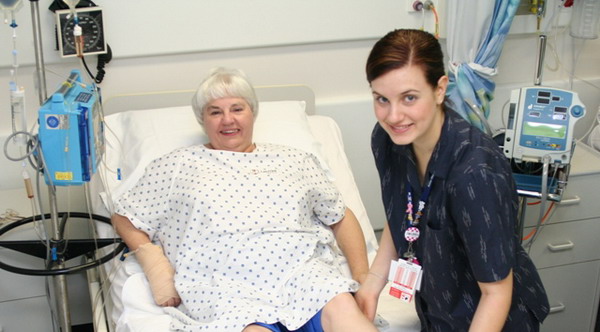Key Challenges
Hospitalisation can be an overwhelming experience for older people and it can make them vulnerable to a variety of complications, adverse events and functional decline. Older people who are admitted to an acute care setting such as a hospital, face particular challenges that require special consideration. For example, if not carefully managed, they may lose their usual condition and level of function, as a result of reduced activity and stimulation. Admission to hospital can also pose major challenges in terms of an older person’s confidence, independence, and change of routine.

I’m having a hysterectomy. I know its a rather big operation. I have had things explained but I would like to know a little bit more about it and I don’t know who I should ask - should I ask the nurses, the doctors and things like that.
I think that, coming into hospital, the most challenging thing was, I just didn’t know where I had to go, where admissions were, what was going to happen when I got here, were they going to take me to my room or did I have to find my own way? And not only that - parking; my husband is rather elderly and I was very worried about him with the parking. Would it be better for us to come by public transport or for him to bring the car?
And I’m a little worried about when they give me my medication because, some of the medication, if I have it at home, I have it after breakfast; if I have it before, I get very, very nauseous. I didn’t know if I should tell the staff that or what I should do about that.
I think the nurses should realise that when you are getting elderly, it is very hard for you to understand what they want of you and if they could sort of explain it to you and help you with it. Like when it comes to showering, do they want you to dry yourself, or do they want to do it? I know their time is very, very limited but it would be very, very good if things were explained to you as you went along. If they could tell you what was going to happen during the day - have I got to go down for x-rays? Have I got to have lunches? If they want me to stay in my room? Am I allowed to go for a walk? Things like that, that’s what I would be very grateful for if I could be told all of that.
I find it very upsetting when you are laying on the bed and your family are here, and the staff come in, and they talk over you. They talk to the family. You are not included in the conversation. It makes you feel as if you’re deaf or something like that. And I’m there lying, listening to all that’s going on, when I would like to know what is really happening.
One of my biggest worries about being in here is that I know that the fact that my husband is worrying about me, but I think I’m very much worrying very much about him. Because as I said, he is elderly and there’s such a lot for him to try and get from home to the hospital. And as I said before, should he use public transport? And I worry about whether he is looking after himself properly. And the doctor said, when I go home, he said I’m not to vacuum for six weeks, not to do the washing and things like that. Now my worry is about my husband; he’ll be left to do all that, even though he’s quite good at doing the cooking, but it’s such a big strain on him, and that’s a big worry for me when I go home.
Hospital-based nurses can help to ensure that older people regain a level of functioning that is as close as possible to, or even better than, what it was before their admission. To achieve this, you will need to ensure that the older patient is assessed holistically, interventions are appropriate, and care is coordinated.
Thinking Challenge
In the video, Betty talks about some of the challenges she is facing as an older person coming into hospital for a hysterectomy.
- Do you think that these challenges are very different to those faced by younger patients coming into hospital?
- As a nurse in an acute care setting, how could you help Betty to feel more comfortable in the hospital environment?
- She is worried about how she will cope when she is discharged from hospital. How could you assist her to prepare for discharge and minimise difficulties when she returns home?
- How could you help Betty’s husband to manage better while his wife is in hospital?
- After looking at the home help options described in the linked resource below, what services could you make Betty aware of, so that her husband might be better cared for in the event that Betty has to return to hospital?




